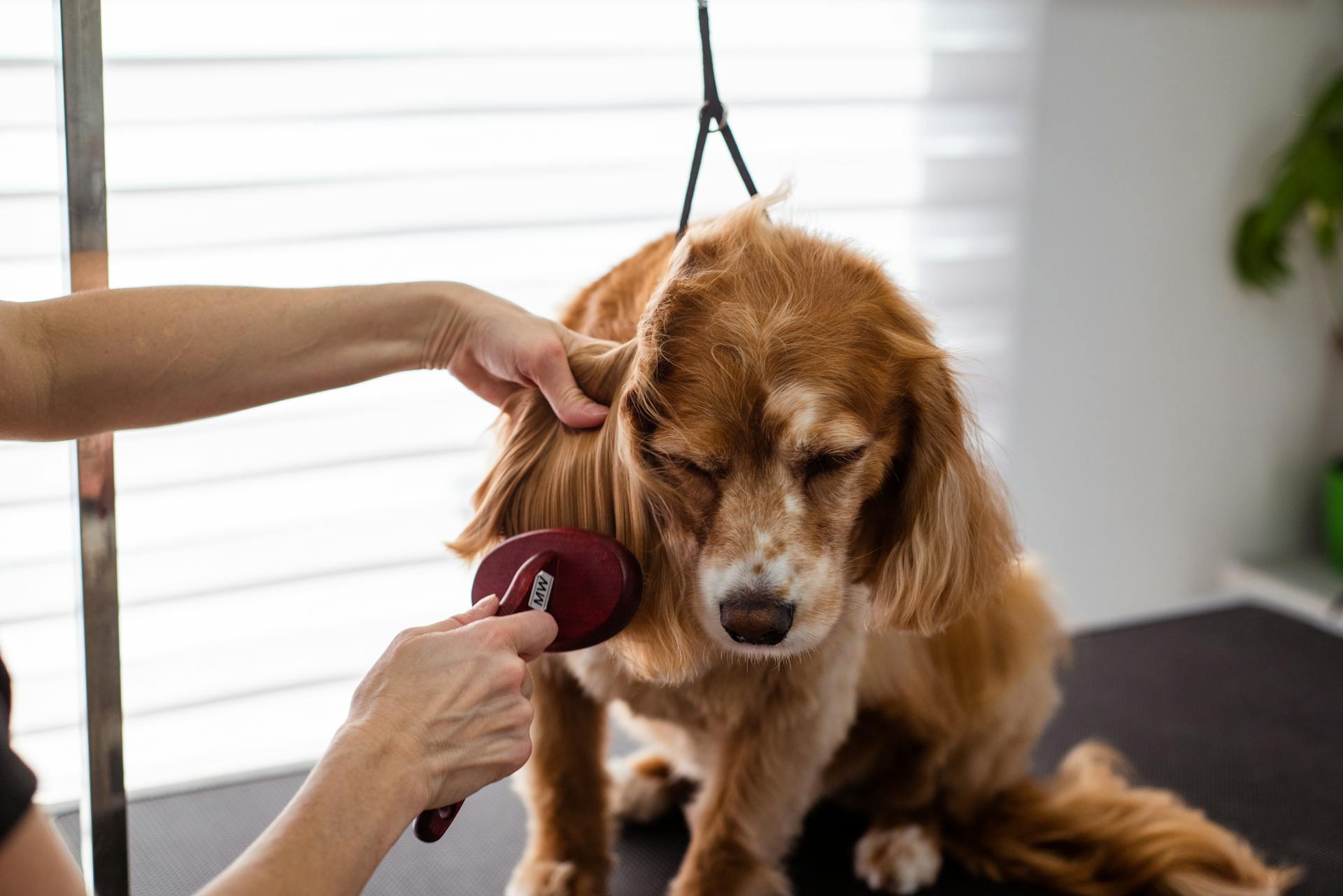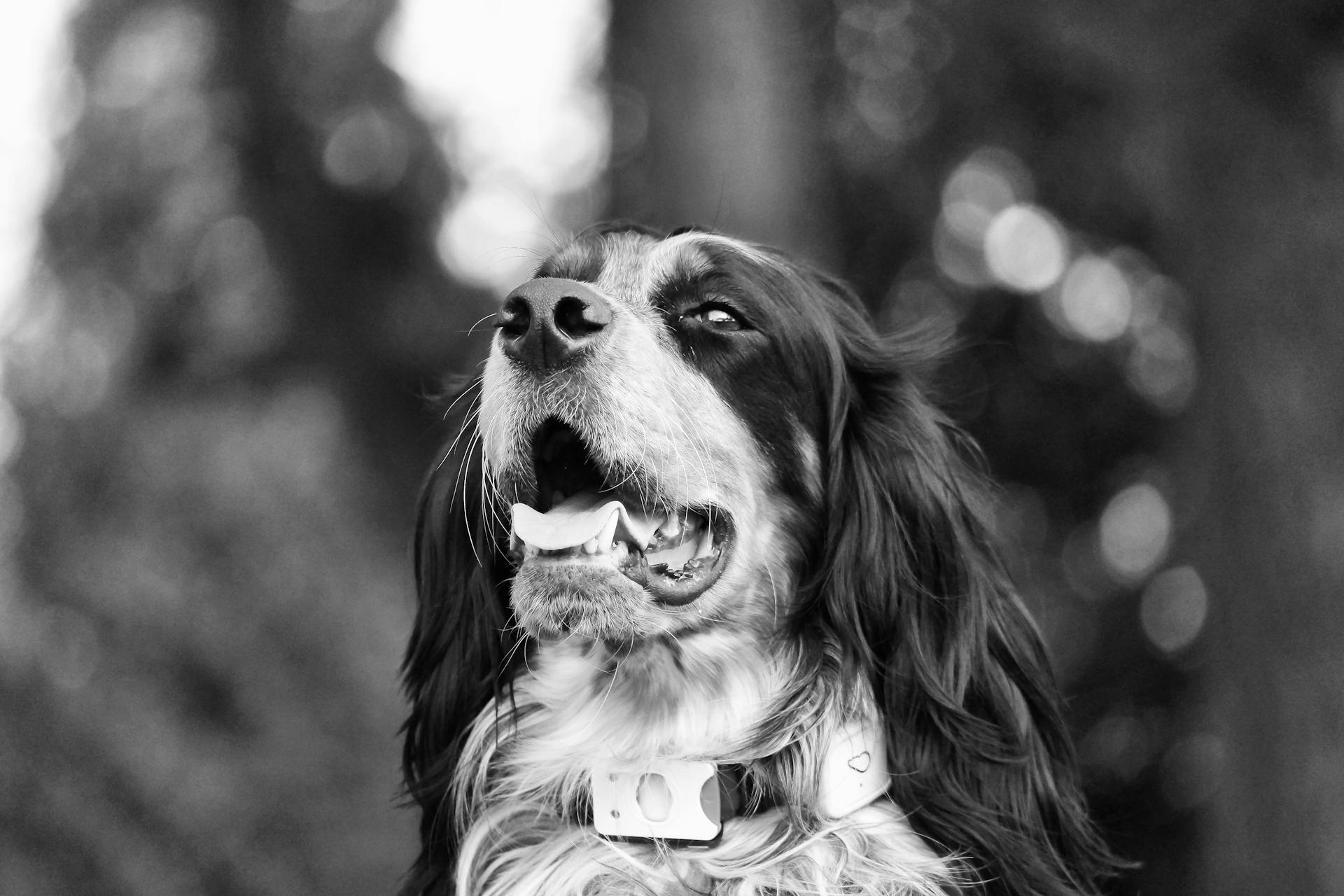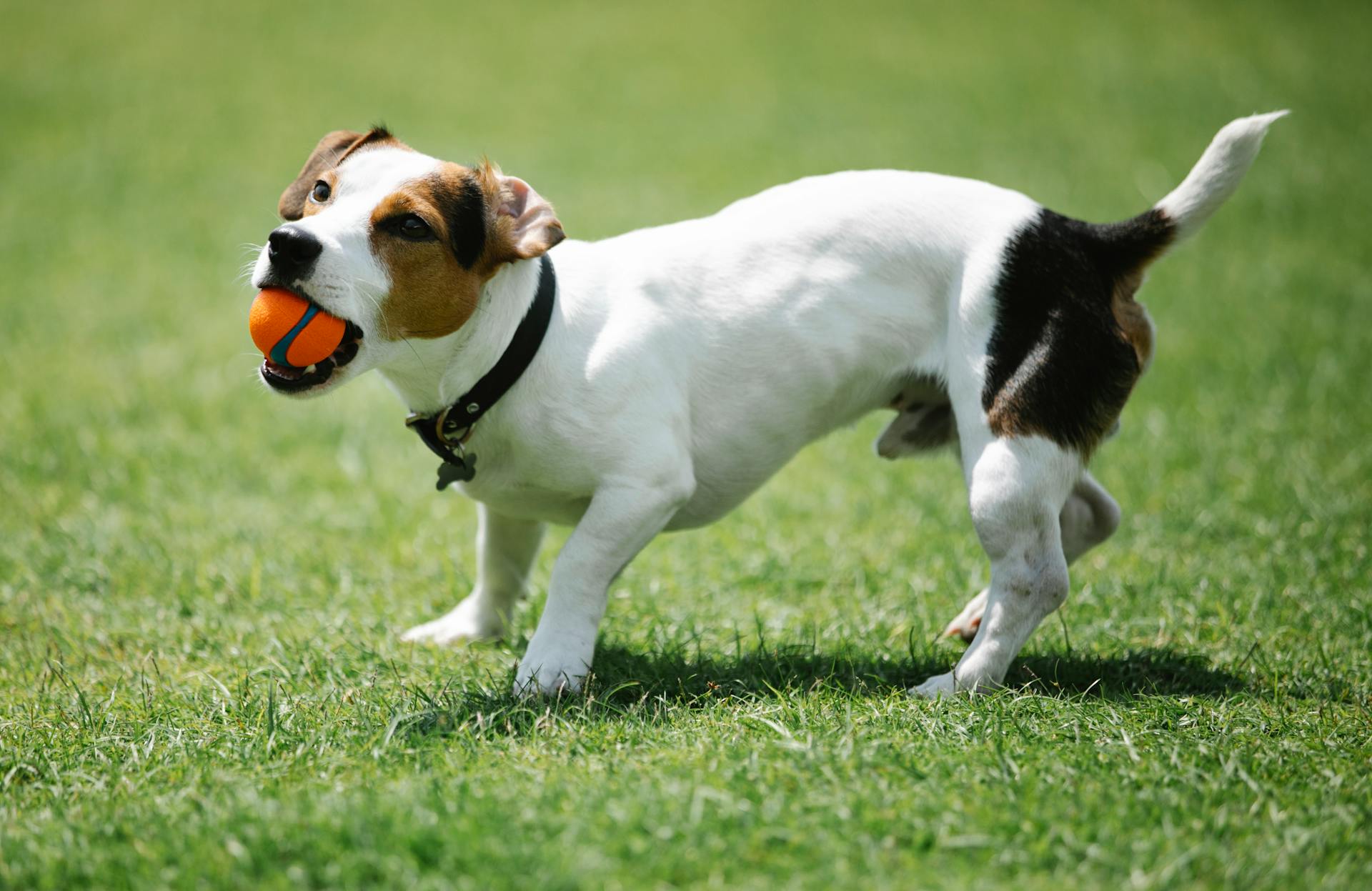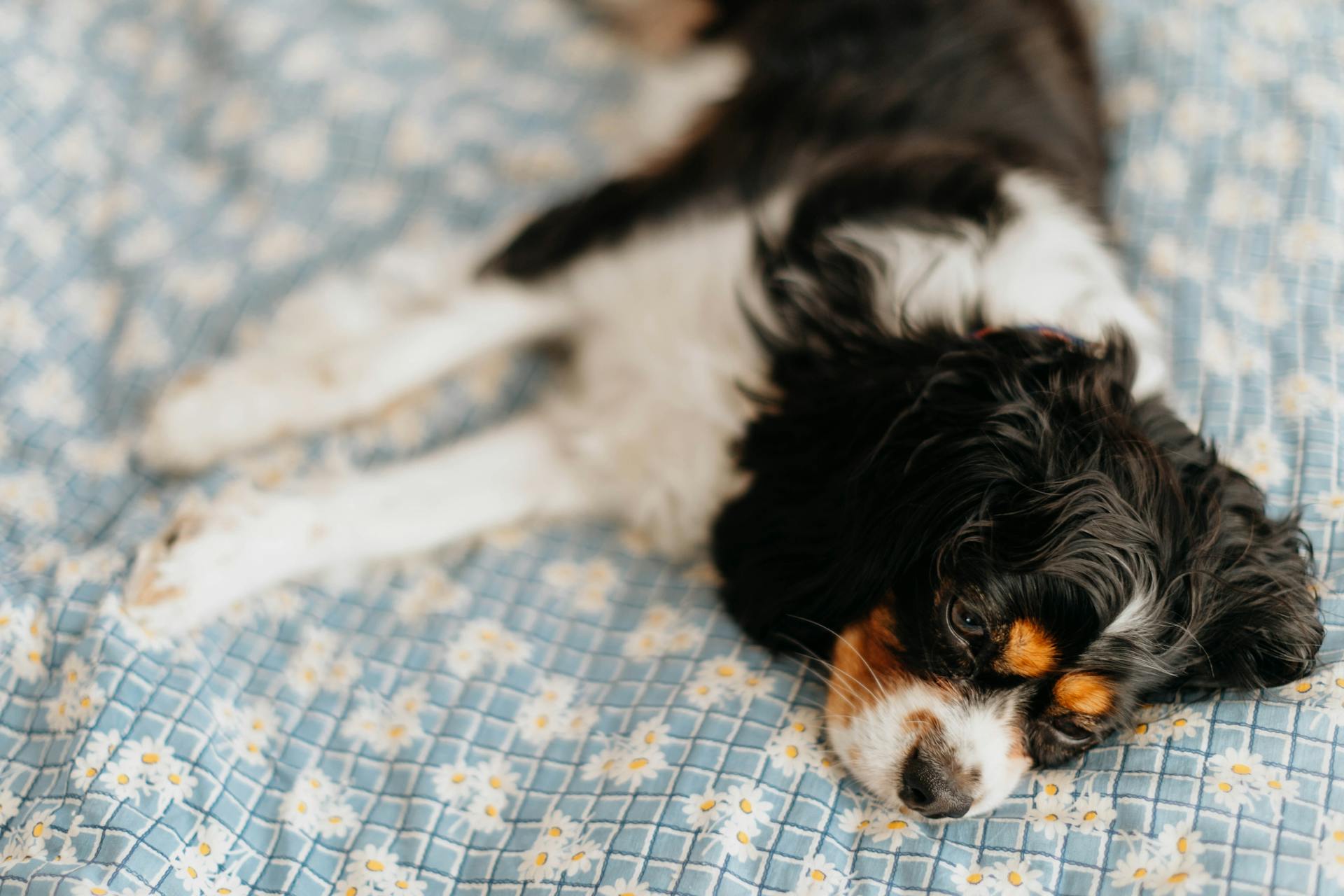
The Cavachon is a crossbreed between a Cavalier King Charles Spaniel and a Bichon Frise, resulting in a friendly and affectionate companion.
They typically weigh between 10-18 pounds and stand between 12-14 inches tall.
Their low-shedding coat requires regular grooming to prevent matting and tangling.
Cavachons are known for their gentle and even-tempered nature, making them a great choice for families with children.
About the Breed
Cavachons are a popular cross breed, a mix between a Cavalier King Charles Spaniel and a Bichon Frise. They've been increasing in popularity over the past 20 years or so.
These lovely dogs are known for their easy-going personalities and low-shedding coats, making them a great choice for first-time dog owners. They're also very small, with delicate and silky fur that's soft to the touch.
Cavachons are social butterflies and need constant attention, so be prepared to focus on them for most of your day. They'll snuggle with you in bed and wait patiently for you outside the bathroom. They'll even wait at the door to say hi to every neighbor that walks by.
Here are some key characteristics of the Cavachon breed:
- Intelligent and easy to train.
- Considered hypoallergenic.
- Extremely tolerant of children.
- Friendly with strangers and other dogs.
- Very low maintenance.
However, Cavachons can also develop separation anxiety and are very sensitive to raised voices. They're prone to poor dental health and tend to become overweight if not properly cared for.
History
The Cavachon has a fascinating history, and it all starts with its parent breeds. The Cavalier King Charles Spaniel has a storied history dating back to the 16th century in England.
Originally bred as lap dogs and companions for aristocrats, they quickly became a favorite among royalty, including King Charles I and King Charles II. Their silky, flowing coat and affectionate nature made them the perfect companion animals for noble families.
The Cavachon itself is a relatively new breed, first intentionally bred in the late 1990s in the United States.
Additional reading: Cavalier King Charles Spaniel Shih Tzu Mix
Overview
The Cavachon breed is a delightful mix between the Cavalier King Charles Spaniel and the Bichon Frise. They're known to be social butterflies, always looking for attention and affection from their owners.
These dogs are extremely social and love to be around people and other dogs. They'll often ask to hang out with friends and neighbors, and even plead to go to the dog park. They thrive on interaction and can become destructive if left alone for too long.
Cavachons are relatively small in size, making them perfect for apartment living due to their low energy levels. They're also low maintenance when it comes to grooming, exercise, and training, making them an ideal choice for first-time dog owners.
They're intelligent and easy to train, but can be prone to separation anxiety if left alone for extended periods. They're also very sensitive to raised voices and may not tolerate cold weather well.
Some potential health issues to be aware of include Brachycephalic Obstructive Airway Syndrome (BOAS) due to their short muzzles, and poor dental health if not properly cared for. They can also become overweight if not monitored.
Here are some key characteristics of the Cavachon breed:
- Intelligent and easy to train
- Considered hypoallergenic
- Extremely tolerant of children
- Friendly with strangers and other dogs
- Very low maintenance
However, they may also exhibit some undesirable traits such as being very sensitive to raised voices, prone to poor dental health, and a tendency to become overweight.
Physical Characteristics
Cavachons typically stand between 12 to 13 inches tall at the shoulder.
Their compact, well-proportioned body is a result of their Cavalier King Charles Spaniel and Bichon Frise heritage.
They usually weigh between 15 to 35 pounds, with some individuals reaching up to 25 pounds.
Their lifespan is around 10 to 15 years, which is a decent amount of time to enjoy their loving companionship.
Their adorable, slightly rounded face is framed by floppy ears that hang down the sides of their head.
Their eyes are large, dark, and full of warmth, reflecting their affectionate nature.
Their tail is often medium-length, carried in a gentle curve over their back or wagging in a friendly manner.
Here's a breakdown of their physical characteristics:
Their short legs carry their compact bodies with ease, and their strong, defined chest is a testament to their sturdy build.
Personality and Temperament
Cavachons are known for their affectionate and friendly personalities, making them ideal companion dogs. They form strong bonds with their families and love being close to their humans.
One of the most notable traits of Cavachons is their need for attention and affection. They often seek attention and will not fare well if left alone for long periods, which can lead to separation anxiety.
Here are some key personality traits of Cavachons:
- Affectionate and Loving
- Friendly and Social
- Playful but Not Overly Energetic
- Adaptable
- Intelligent and Eager to Please
- Gentle and Calm
- Low Barking Tendency
Cavachons are also great with children and will tolerate certain behaviors that other dogs can find annoying. They are easy-going and make great family dogs. They are intelligent and like to use their active minds, making them quick learners and easy to train.
In fact, Cavachons love to learn and please their owners, so start early and continue throughout their lifetime to train them in etiquette, obedience, and tricks. They will not react well to negative feedback, so positive reinforcement is key.
Overall, Cavachons are a perfect breed for families who want a loving and loyal companion. They are perfect lap dogs and will snuggle into any lap that is available.
Care and Grooming
Regular veterinary checkups are crucial to detect any health concerns early, so make sure to schedule those appointments with your vet.
Cavachons have moderate grooming needs due to their soft, often wavy or curly coats, which can be prone to matting and tangling.
To keep their coat healthy and looking its best, regular grooming is essential. Brush your Cavachon once or twice a week to prevent matting and tangling.
Cavachons have floppy ears, which can trap moisture and dirt, increasing the risk of infections. Their ears should be checked and cleaned weekly to prevent wax buildup and infections.
Dental hygiene is also important, so brush your Cavachon's teeth 2 to 3 times a week to prevent plaque buildup and dental disease.
Their nails should be trimmed every 4 to 6 weeks or as needed. If you can hear their nails clicking on the floor, it's time for a trim.
Regularly checking and wiping around their eyes can help prevent tear staining, which is common in lighter-coated Cavachons.
Here's an interesting read: How to Groom a Cavachon
Here's a quick rundown of their grooming needs:
- Brush their coat 1-2 times a week
- Check and clean their ears weekly
- Brush their teeth 2-3 times a week
- Trim their nails every 4-6 weeks
- Check and wipe around their eyes regularly
By following these grooming tips, you'll be able to keep your Cavachon looking and feeling its best.
Training and Behavior
Training a Cavachon requires early socialization and positive reinforcement training, as they can be stubborn if not trained properly. Their intelligence allows them to pick up commands quickly, but they need consistent training from the start.
Cavachons are highly trainable, responding well to praise, treats, and affection. They thrive on positive feedback and can become bored or destructive if left unstimulated. Puzzle toys and fun tricks are great ways to keep their minds occupied.
They are not fond of being left alone and can become destructive if not well trained, making crate training a good idea from an early age. Housebreaking is relatively easy, but adult Cavachons may require extra attention due to potential past issues.
See what others are reading: Pros and Cons of Shock Collars
Early Acclimation Is Key
Early acclimation is key to setting your Cavachon up for success. Getting them accustomed to grooming procedures from a young age makes the process easier and more enjoyable for both of you.
Handle their paws frequently to help them get used to the sensation. This will make nail trimming and other paw-related tasks a breeze.
Cavachons are sensitive and respond well to positive reinforcement, so be sure to reward them for good behavior during grooming sessions. This will help them associate grooming with positive experiences.
Regular grooming sessions will also help your Cavachon get used to being handled, making veterinary exams and other handling a stress-free experience.
Activity Level
Cavachons have plenty of energy and are happy to go places with their owners and meet and greet people.
They love to sit with you or be in your lap and will nap with you. This adaptable nature makes them a great companion for daily activities.
Cavachons will bark to let you know there is someone at the door. You can train your Cavachon to bark and to stop on command.
It's essential to get your dog exercise every day because they can easily become overweight.
Health and Nutrition
The health and nutrition of Cavachons is something to take seriously. They're prone to heart disease and other health issues due to their Cavalier King Charles Spaniel and Bichon Frise heritage.
Regular grooming is essential to prevent dental issues, so brush your Cavachon's teeth daily and check their ears 2-3 times a week. Cleaning their ears can help prevent infections and other problems.
Cavachons can become overweight easily, so it's crucial to feed them a measured amount twice a day and avoid leaving food out all the time. This will help keep them at a healthy weight and prevent related health issues.
With a lifespan of 12-14 years, it's essential to prioritize your Cavachon's health and nutrition from an early age. Regular exercise, such as daily walks or playtime in the house, can also help keep them healthy and happy.
A fresh viewpoint: Cavachon Health Problems
Feeding and Nutrition
As you're planning to bring a Cavachon into your family, it's essential to consider their dietary needs, which will change throughout their life stages. Cavachons are prone to becoming overweight, so it's crucial to feed them a measured amount twice a day.
You should avoid leaving food out all the time, as this can lead to overeating and obesity.
Small breeds like Cavachons are prone to dental issues, so daily brushing of their teeth is a must.
A healthy diet for your Cavachon will depend on their age, so be sure to ask your veterinarian for recommendations about their diet.
Here's a quick guide to Cavachon nutrition at different life stages:
Remember, every dog is unique, so work closely with your veterinarian to determine the best diet for your Cavachon.
Lifespan of [Breed]
The lifespan of your furry friend is a crucial aspect of their overall health and well-being. Most smaller breeds, like the Cavachon, can live for 10-15 years.
A lengthy lifespan is a blessing, allowing you to spend many wonderful years with your beloved companion.
Curious to learn more? Check out: Life Expectancy Cavachon
Family and Lifestyle
Family and lifestyle considerations are crucial when deciding to bring a Cavachon into your home. They thrive in households with various dynamics and make excellent pets for families of all sizes.
Cavachons are social butterflies and need constant attention, so be prepared to focus on them for a significant part of your day. They'll follow you everywhere, even waiting patiently outside the bathroom while you shower.
Their friendly, affectionate nature makes them a great fit for families with children or other pets, but proper introductions and training are necessary to ensure a harmonious household. They'll even get along with cats and other animals if treated with respect and care.
Here are some key family and lifestyle considerations to keep in mind:
A Day in the Life of This Breed
A day in the life of a Cavachon is all about attention and socialization. They'll snuggle with you in bed until you're ready to get up, and then they won't leave your side.
These Velcro dogs need constant attention, so be prepared to focus on them for most of the day. If you leave them alone for too long, they'll cry or may even become destructive.
Cavachons are social butterflies and will ask to hang out with friends, both human and canine companions, during the day. They'll desperately plead to go to the dog park and will wait at the door to say hi to every neighbor that walks by.
Here are some things you can expect to do with your Cavachon on a daily basis:
- Run around and play fetch or swim for about half an hour
- Take a lengthy nap curled up in your lap after playtime
It's not uncommon for Cavachons to wait patiently outside the bathroom while you shower, or outside the kitchen while you eat breakfast. They'll even wait for scraps you're willing to spare.
Remember, Cavachons are not fans of cold weather, so make sure to keep them indoors when it's chilly outside.
Family Compatibility
Family Compatibility is crucial when choosing a pet, and the Cavachon is a great fit for many households. Cavachons are highly compatible with families and make excellent pets for households with various dynamics.
Their friendly, affectionate nature makes them a great fit for families of all sizes. They enjoy the company of other dogs, but need their fair share of attention from their owner.
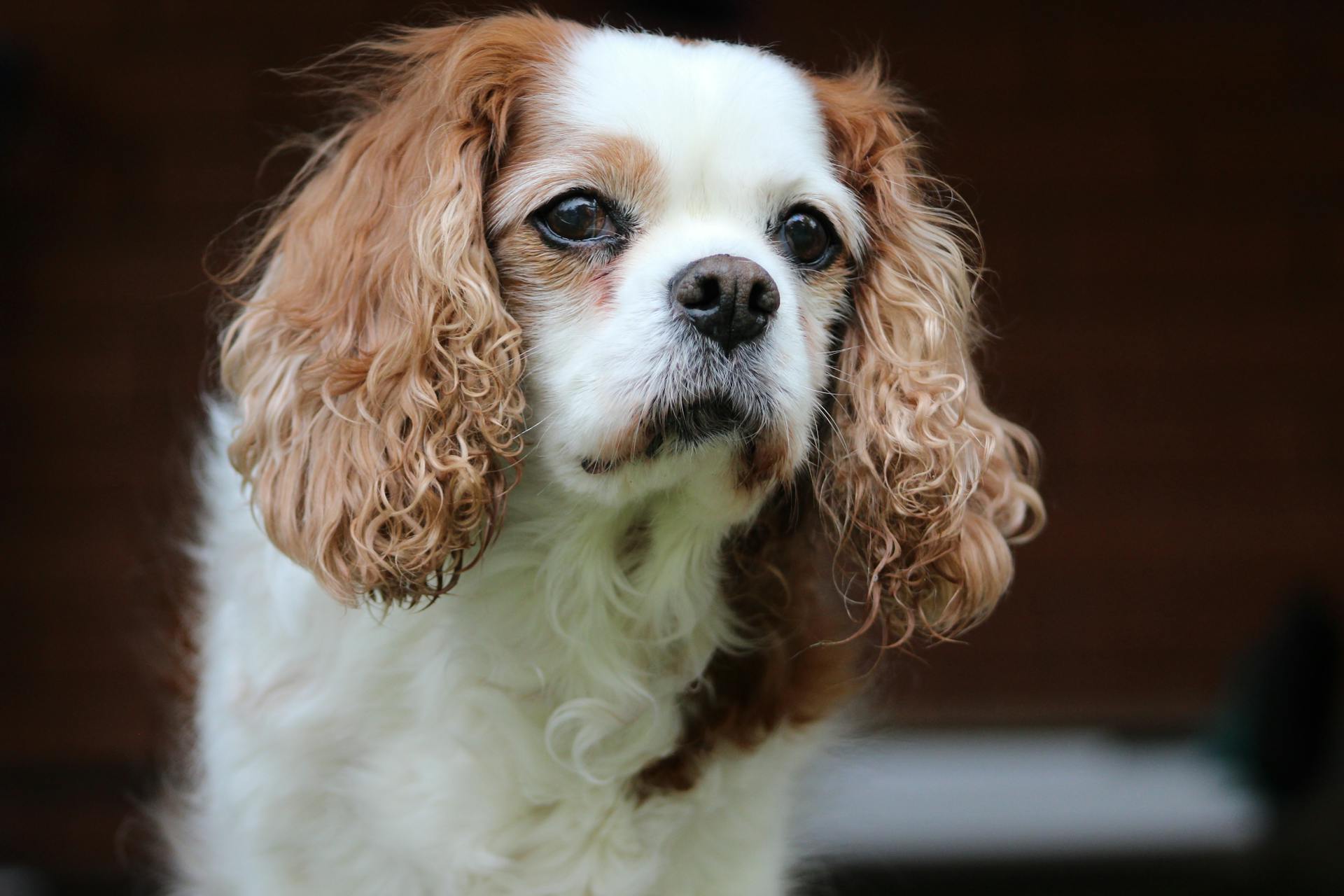
With proper introductions and training, the Cavachon can get along with cats and other animals. It's essential to supervise any interactions between dogs and young children to prevent biting or ear or tail pulling.
Teach your child to approach dogs calmly and never to approach any dog while it’s eating or sleeping.
Buying and Owning
Buying a Cavachon requires careful consideration. Make sure to research the breeder thoroughly to avoid puppy mills in disguise.
Before bringing your new pup home, ensure they've been genetically tested for common conditions like syringomyelia to avoid costly vet bills. This is a crucial step in responsible pet ownership.
If you work long hours or are often away from home, a Cavachon may not be the best fit due to their tendency to develop separation anxiety. These dogs need attention and social interaction.
Cavachons are social butterflies and will drag you to meet new people, so be prepared for a life of socializing. If you're extremely introverted, this breed may not be for you.
To prevent weight gain, feed your Cavachon carefully and limit treats. Their coat type and shedding are also important considerations: if you're looking for a hypoallergenic coat, ensure your pup has a short coat.
A crate can be a lifesaver for reducing separation anxiety in Cavachons. Train your puppy to stay in a crate early on to help with this.
Cost
The cost of owning a Cavachon is something to consider. You can expect to pay between $700 and $1500 for a puppy.
These prices have increased due to the breed's popularity, making it a significant investment. If you're looking for an adult Cavachon, you can adopt one for around $250.
Adoption fees can range from $200 to $350, depending on the organization. The table below breaks down the estimated costs:
Buyer's Tips
When buying a Cavachon, it's crucial to find a reputable breeder. Research is key to avoid puppy mills in disguise.
A reputable breeder should also conduct genetic testing for common conditions like syringomyelia. This will save you from massive vet bills down the line.
If you work long hours or are not home often, it's best to reconsider adopting a Cavachon. These pups can develop separation anxiety and don't like to be left alone.
Cavachons are super social dogs that thrive on interaction. If you're an introvert, this breed might not be the best fit for you.
These dogs are prone to weight gain, so be careful with their food intake and treat them sparingly. Limiting their food and treats will help keep them healthy.
To reduce separation anxiety, train your puppy early on to stay in a crate. This will give you peace of mind when you're away.
If you're buying a Cavachon for their hypoallergenic coat, make sure to check if they have long hair. Longer-haired puppies are likely not hypoallergenic.
Discover more: Pros and Cons of Feeding Dogs Human Food
Pros and Cons
Cavachon owners love their gentle and affectionate nature, but this also means they can be wary of strangers, requiring time to warm up to new people.
Cavachons are adaptable to apartment living due to their relatively small size and moderate energy level, but they do require regular exercise to stay happy and healthy.
Their low-shedding coat is a major advantage for those with allergies or a preference for less dog hair, but it does require regular grooming to prevent matting.
Pros
The pros of this topic are numerous and impressive.
One of the main advantages is that it has the potential to revolutionize the way we live and work.
It can save us time and effort, making our lives easier and more efficient.
For instance, it can automate tasks that are repetitive and time-consuming, freeing us up to focus on more important things.
This technology is also highly reliable and can operate with minimal human intervention.
It's also cost-effective in the long run, as it can reduce labor costs and increase productivity.
By implementing it, businesses can also improve customer satisfaction and loyalty.
This can lead to increased revenue and a competitive edge in the market.
Cons
The cons of this system are worth considering. One major drawback is the potential for security risks, as highlighted in the article section on "Security Concerns", where it's mentioned that the system's reliance on AI algorithms can make it vulnerable to cyber attacks.
The learning curve can be steep, especially for those without prior experience in AI or programming. This is evident from the "Technical Requirements" section, which notes that a strong background in computer science is necessary to fully utilize the system's capabilities.
Another con is the high cost associated with implementing and maintaining the system. This is a key point made in the "Cost Analysis" section, which reveals that the initial investment can be substantial and ongoing expenses can add up quickly.
The system's limitations in handling complex or abstract tasks are also worth noting. As the "Task Limitations" section points out, the system is best suited for routine or well-defined tasks, and may struggle with tasks that require creativity or outside-the-box thinking.
The reliance on data quality is another con that's worth mentioning. As the "Data Requirements" section notes, the system's accuracy and effectiveness depend heavily on the quality of the data it's trained on, and poor data can lead to poor results.
Featured Images: pexels.com
